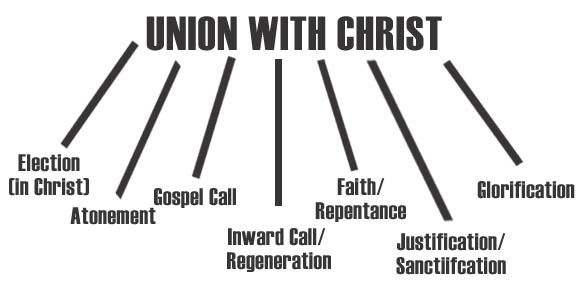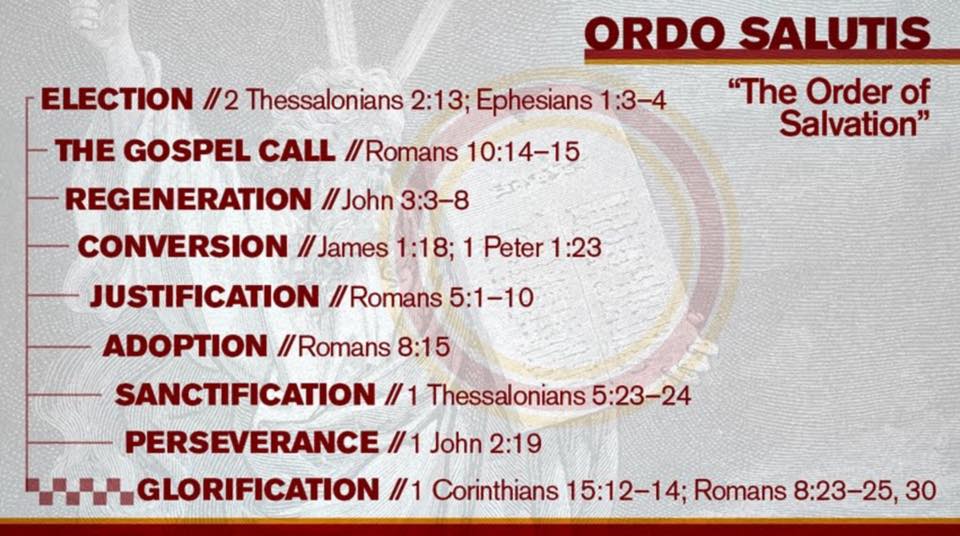Here is the order of salvation from the scripture.
- that if you confess with your mouth the Lord Jesus and believe in your heart that God has raised Him from the dead, you will be saved.
First and foremost for us to
be saved, we must
hear the Gospel message of salvation; good news of Jesus Christ
Secondly, we must believe the message (word) that we hear; Believing according to scripture involves obeying, which means confessing Jesus as Lord.
Again, to
be saved - a person must
hear and
believe the Gospel message of salvation.
Those by the wayside are the ones who hear; then the devil comes and takes away the word out of their hearts, lest they should believe and be saved. Luke 8:12
8 But what does it say? “The word is near you, in your mouth and in your heart” (that is, the word of faith which we preach): 9 that if you confess with your mouth the Lord Jesus and believe in your heart that God has raised Him from the dead,
you will be saved. 10 For with the heart one believes unto righteousness, and with the mouth confession is made unto salvation. 11 For the Scripture says, “Whoever believes on Him will not be put to shame.” 12 For there is no distinction between Jew and Greek, for the same Lord over all is rich to all who call upon Him. 13 For “whoever calls on the name of the LORD shall be saved.” How then shall they call on Him in whom they have not believed? And how shall they believe in Him of whom they have not heard? And how shall they hear without a preacher? 15 And how shall they preach unless they are sent? As it is written:
“How beautiful are the feet of those who preach the gospel of peace, Who bring glad tidings of good things!” But they have not all obeyed the gospel. For Isaiah says, “LORD, who has believed our report?” 17 So then faith comes by hearing, and hearing by the word of God. Romans 10:8-17
These are great sections of scripture. Here is a helpful article that comments on the Ordo salutis found on monergism .com
Ordo Salutis
SUBTOPICS
Ordo Salutis - Classic Essays (22)
Ordo Salutis - Contemporary Essays (69)
Ordo Salutis - Multimedia (26)
Related Resources:
Union with Christ -
Regeneration
The “Ordo salutis” is a Latin term which means “the order of salvation”. It speaks of a way of organizing all the events of redemption in the consecutive order that they show up in an individual's life (as revealed in the bible) when he is joined to Christ by the Holy Spirit. Keep in mind we must never separate the benefits (regeneration, justification, sanctification) from the Benefactor (Jesus Christ). The entire process (election, redemption, regeneration, etc.) is the work of God in Christ and is by grace alone.
All the benefits of redemption such as conversion (faith & repentance), justification, sanctification and perseverance presuppose a renewed heart (the existence of spiritual life) which believes. The work of applying God's grace is a unitary process given to the elect simultaneously in Christ. This is instantaneous, but there is a causal order between regeneration and the rest of Christ's redemptive benefits which spring from it. Though these benefits cannot be separated, it is helpful to distinguish them. Therefore, instead of imposing a chronological order we should view these as
a unitary work of God to bring us into union with Christ. We must always keep in mind that the orders expressed in the following articles occur together or happen simultaneously like heat and fire. All aspects of the work of God continue together throughout the life of a Christian.
Jesus Christ is the source of all redemptive blessings, including regeneration, justification, sanctification (1 Cor 1:30). Election is the superstructure of our ordo salutis (a blueprint, so to speak, of what God intends to do for elect sinners in time), but not itself the application of redemption. Regeneration, the work of the Holy Spirit which brings us into a living union with Christ, has a causal priority over the other aspects of the process of salvation.
- God opens our eyes, we see.
- God circumcises/ unplugs our ears, we hear.
- Jesus calls a dead and buried Lazarus out of the grave, he comes; (Eph 2:5)
- In the same way, the Holy Spirit applies regeneration, (opening our spiritual eyes and renewing our affections), immediately and infallibly resulting in faith. (John 6:63, 65)
Historically in the Church there has been disagreement about the order of salvation, especially between those in the Reformed and Arminian camps. The following two perspectives of God's order in carrying out His redemptive work reveals the stark contrast between these two main historic views. Keep in mind that both viewpoints are based on the redemptive work which Christ accomplished for His people in history:
In the Reformed camp, the ordo salutis is 1)
election/
predestination (in Christ), 2)
Atonement 3)
gospel call 4)
inward call 5)
regeneration, 6)
conversion (
faith &
repentance), 7)
justification, 8)
sanctification, and 9)
glorification. (Rom 8:29-30). To be more precise see the following chart with text overlapping and the redemptive benefits of Christ springing from our (Spirit-initiated) union with Christ:
In the Arminian camp, the ordo salutis is 1) outward call 2) faith/election, 3) repentance, 4) regeneration, 5) justification, 6) perseverance, 7) glorification.
Note: Remember the Reformed understanding ordo is not linear, so redemptive benefits such as regeneration, faith, repentance, justification and sanctification occur
concurrantly. In other words, by placing
repentance prior to
justification in the above chart it does not mean, in any way, that repentance causes justification, or is a condition for pardon.
[
See our essay on Repentance in the Ordo Salutis for a detailed explanation] Also see Horatius Bonar's essay
Insensibility.
Remember all else springs from Christ and our union with Him. He gives faith... He gives repentance. Salvation springs from Christ alone.
Faith and repentance are fruits of the Spirit's regenerating work in the soul. This biblical order is that regeneration precedes faith (John 6:63, 65, 6:37) and ensures us that our salvation is wholly of God and by grace alone, not a cooperation of man and God.
"It is because of him that you are in Christ Jesus, who became to us wisdom from God, righteousness and sanctification and redemption, so that, as it is written, “Let the one who boasts, boast in the Lord." (1 Cor 1:30-31). So we ought not to see this order as a linear order, but as a unitary work of God. Consider, if you strike the cue ball with a pool stick (cue), it rolls across the table a strikes the ball that you intend to sink into the pocket. The cue ball and the other ball stike
simultaneously, yet it is the cue ball which
causes the other ball to move. Likewise it is the regenerating grace of God in Christ which gives rise to the other aspects of the application of redemption.







